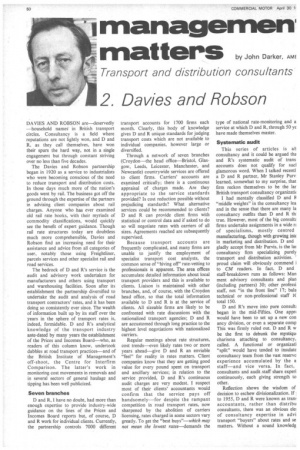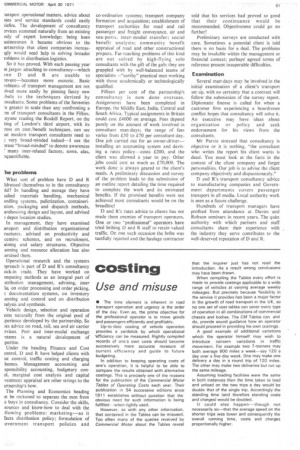managemen
Page 52

Page 53

If you've noticed an error in this article please click here to report it so we can fix it.
matters by John Darker AM
-Transport and distribution consultants
2. Davies and Robson
DAVIES AND ROBSON are—deservedly —household nameg in British transport circles. Consultancy is a field where reputations are not lightly won, and D and R, as they call themselves, have won their spurs the hard way, not in a single engagement but through constant striving over no less than five decades.
The Davies and Robson partnership began in 1920 as a service to industrialists who were becoming conscious of the need to reduce transport and distribution costs. In those days much more of the nation's goods went by rail. The business got off the ground through the expertise of the partners in advising client companies about rail charges. Anyone who has ever examined old rail rate books, with their myriads of commodity classifications, would quickly see the benefit of expert guidance. Though rail rate structures today are doubtless much more comprehensible, Davies and Robson find an increasing need for their assistance and advice from all categories of user, notably those using Freightliner, parcels services and other specialist rail and road services.
The bedrock of D and R's service is the audit and advisory work undertaken for manufacturers and others using transport and warehousing facilities. Soon after its establishment the partnership diversified to undertake the audit and analysis of road transport contractors' rates, and it has been doing so consistently ever since. The wealth of information built up by its staff over the years in the sphere of transport rates is, indeed, formidable. D and R's analytical knowledge of the transport industry ante-dated by many years the establishment of the Prices and Incomes Board—who, as readers of this column know, undertook dabbles at road transport practices—and of the British Institute of Management's off-shoot, the Centre for Interfirm Comparison. The latter's work in monitoring cost movements in removals and in several sectors of general haulage and tipping has been well publicized.
Seven branches D and R, I have no doubt, had more than enough expertise to provide industry-wide guidance on the lines of the Prices and Incomes Board reports but, of course, D and R work for individual clients. Currently, the partnership controls 7000 different transport accounts for 1700 firms each month. Clearly, this body of knowledge gives D and R unique standards for judging transport costs which are not available to individual companies, however large or diversified.
Through a network of seven branches (Croydon—the head office—Bristol, Glasgow, Leeds, Leicester, Manchester, and Newcastle) countrywide services are offered to client firms. Carriers' accounts are examined critically; there is a continuous appraisal of charges made. Are they appropriate to the service standards provided? Is cost reduction possible without prejudicing standards? What alternative services could be recommended to clients? D and R can provide client firms with statistical or control data and if asked to do so will negotiate rates with carriers of all sizes. Agreements reached are subsequently supervised.
Because transport accounts are frequently complicated, and many firms are unable to justify the employment of specialist transport cost analysts, the common sense of "hiving off' rate-vetting to professionals is apparent. The area offices accumulate detailed information about local transport providers and this is available to clients. Liaison is mahitained with other branches, and, of course, with the Croydon head office, so that the total information available to D and R is at the service of clients. All sizeable firms are likely to be confronted with rate discussions with the nationalized transport agencies; D and R are accustomed through long practice to the highest level negotiations with nationalized carriers.
Regular meetings about rate structures, cost trends—even likely rates two or more years ahead—give D and R an enviable "feet" for reality in rates matters. Client companies know that they are getting good value for every pound spent on transport and ancillary services; in relation to the service provided, D and R's continuous audit charges are very modest. I suspect most of their clients' accountants would confirm that the service pays off handsomely—for despite the rampant competition in road transport rates, now sharpened by the abolition of carriers licensing, rates charged in some sectors vary greatly. To get the "best buys"—which may not mean the lowest rates—demands the
type of national rate-monitoring and a service at which D and R, through 50 ye have made themselves master.
Systematic audit
This series of articles is at consultancy and it could be argued tha and R's systematic audit of trans accounts does not qualify for sucl glamorous word. When I talked recent! a D and R partner, Mr Stanley Purv learned, somewhat to my surprise, that firm reckon themselves to be the lar British transport consultancy organizati■ I had mentally classified D and I; "middle weights" in the consultancy lea and in the sense that there are many la consultancy outfits than D and R th true. However, most of the big consult firms undertake assignments in a wide r; of specialisms, mostly centred manufacturing, though with growing int( in marketing and distribution. D and gladly accept from Mr Purvis, is the lai consultancy firm specializing purely transport and distribution activities. ' proud claim will obviously commend i to CM readers. In fact, D and staff-breakdown runs as follows: Man ment advisory consultants and plan (including partners) 30; other professi staff, not "in the front line" 17; bala technical or non-professional staff R total 150.
D and R's move into pure consult began in the mid-Fifties. One appr■ would have been to set up a new con ancy division, or even a separate comp This was firmly ruled out. D and R w be the first to debunk the mystiqui charisma attaching to consultancy, called. A functional or organizati "split" would have tended to insulate consultancy team from the vast reserve experience accumulated by the a staff—and vice versa. In fact, consultants and audit staff share experi continuously, each giving strength to other.
Reflection shows the wisdom of decision to eschew clivisionalization. If to 1955, D and R were known as tram accountants, rather than distribu consultants, there was an obvious elei of consultancy expertise in advi transport "buyers" about rates and se matters. Without a sound knowledg
.ansport operational matters, advice about nes and service standards could easily tisfire. The development of consultancy !rvices stemmed naturally from an existing ody of expert knowledge; being keen usinessmen it became obvious to the artnership that client companies increasigly would need help in solving broader roblems in distribution logistics.
So it has proved. With each passing year le jargon attaching to consultancy—which yen D and R are unable to revent—becomes more esoteric. Basic roblems of transport management are not Rved more easily by pinning fancy new Lbels to the techniques devised by )nsultants. Some problems of the Seventies 7e greater in scale than any confronting a rm of transport consultants in the Fifties. .nyonc reading the Roskill Report, on the ting of London's third airport, with its ress on cost/benefit techniques, can see Lat modern transport consultants need to very broad-minded indeed—I use the :lime "broad-minded" to denote awareness 7 many inter-related factors; some, alas, :quantifiable.
he problems What sort of problem have D and R 'dressed themselves to in the consultancy Rd? In handling and storage they have udied materials handling, mechanical indling systems, palletization, containeddion, packaging and dispatch methods, arehousing design and layout, and advised depot location studies.
In management, they have examined ansport and distribution organizational ructures. advised on productivity and centive schemes, and on recruitment, aining and salary structures. Objective arming and resource allocation has also :ercised them.
Operational research and the systems )proach is part of D and R's consultancy ock-in trade. They have worked on )mputing methods as an integral part of stribution management, advising, inter 'ía, on order processing and order picking, documentation systems, on inventory anning and control and on distribution ialysis and synthesis.
Vehicle design, selection and operation ems naturally from the original pool of Lperience developed by the partnership. So )es advice on road, rail, sea and air carrier Tvices. Port and inter-modal exchange 'stems is a natural development of :pertise.
Under the heading Finance and Cost ontrol, D and R have helped clients with )st control, traffic costing and charging :hemes. Management accounting and .sponsibility accounting, budgetary conol, marginal cost analysis and capital vestment appraisal are other strings to the trtnership's bow.
The Planning and Economies heading in be reckoned to separate the men from e boys in consultancy. Consider the skills, sources and know-how to deal with the 'Rowing problems: marketing—as it Teets distribution policy; formulation of overnment transport policies and co-ordination systems; transport company formation and acquisition; establishment of transport authorities for road and rail passenger and freight conveyance, air and sea-ports, inter-modal transfer; social benefit analysis; community benefit appraisal of road and other constructional projects. Far-reaching problems of this kind are not solved by high-flying solo consultants with the gift of the gab; they are grappled with by well-balanced teams of specialists--"earthy" practical men working with those academically or technologically qualified.
Fifteen per cent of the partnership's consultancy is now done overseas. Assignments have been completed in Europe, the Middle East, India, Central and South Africa. Typical assignments in Britain could cost £4000 on average. Fees depend purely on the amount of work involved in consultant man-days; the range of fees varies from £50 to £70 per consultant-day. One job carried out for an owner-driverinstalling an accounting system and devising a rates policy----costs £200, and the client was allowed a year to pay. Other jobs could cost as much as £70,000. The work .done is always geared to the client's needs. A preliminary discussion and survey of the problem leads to the submission of an outline report detailing the time required to complete the work and its estimated benefits. If the promised benefits were not achieved most consultants would be on the breadline!
D and R's rates advice to clients has not made them enemies of transport operators. One or two "professional" operators have tried bribing D and R staff to retain valued traffic. On one such occasion the bribe was tactfully rejected and the haulage contractor told that his services had proved so good that their continuance would be recommended. Objectiveness could go no further!
Preliminary surveys are conducted with care. Sometimes a potential client is told there is no basis for a deal. The problems may be insoluble within the management or financial context; perhaps' agreed terms of reference present insuperable difficulties.
Examination
Several matr,clays may be involved in the initial examination of a client's transport set-up, with no certainty that a contract will follow the submission of the survey report. Diplomatic finesse is called for when a customer firm experiencing a boardroom conflict hopes that consultancy will solve it. An executive may have ideas about organization or policy and seek endorsement for his views from the consultants.
Mr Purvis stressed that consultancy is objective or it is nothing. "the consultant who writes the report his client wants is dead. You must look at the facts in the context of the client company and forget personalities. Our job is to advise the client company objectively and dispassionately."
D and R's transport consultancy advice to manufacturing companies and Govern ment departments covers passenger transport in all media. Local authority work is seen as a future challenge.
Hundreds of transport managers have profited from attendance at. Davies and Robson seminars in recent years. The quiet authority with which partners and staff consultants share their experience with the industry they serve contributes to the well-deserved reputation of D and R.




























































































